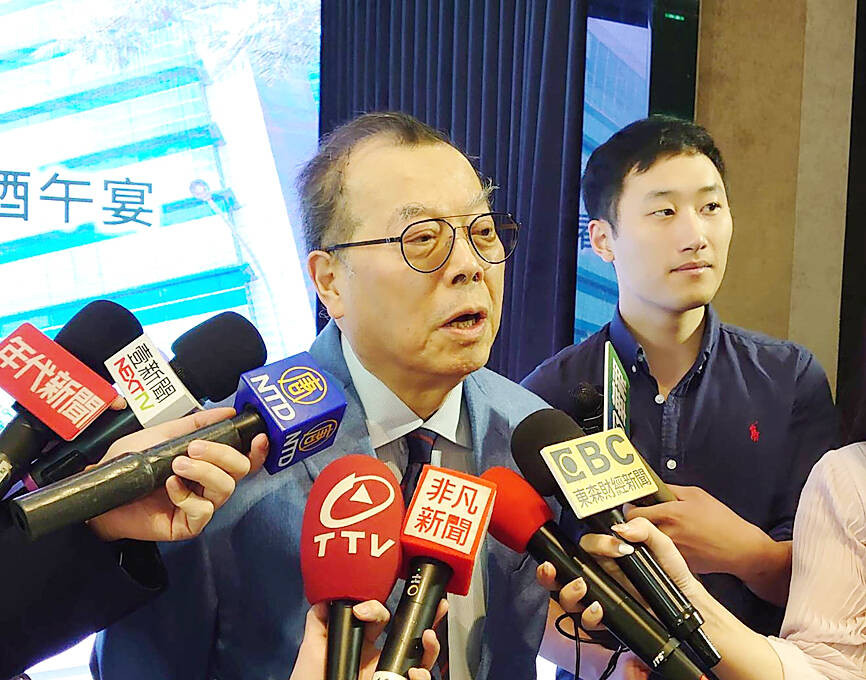Contract chipmaker Powerchip Semiconductor Manufacturing Corp (力積電) yesterday gave an upbeat outlook for the second half of this year on the back customers’ eagerness to transfer orders from Chinese chipmakers in response to US chip restrictions.
Revenue from the new orders would become noticeable in July or August, and be even greater next year, the company projected.
“Many customers approached us after US-China trade frictions escalated,” Powerchip president Brian Shieh (謝再居) told a news conference. “We believe this should be a good business.”

Photo: CNA
The positive outlook also reflects a pickup in chip demand as businesses reopen after the long Lunar New Year holiday, Shieh said.
This year is a “transformation year” for Powerchip as the company aims to optimize its product portfolios, he said.
The company aims to reduce its exposure to lower-margin driver ICs used in flat panels and sensors amid cutthroat price competition with Chinese chipmakers, he said.
Revenue from driver ICs and sensors are expected to account for 15 percent of the company’s total revenue this year, halved from 30 percent last year, Powerchip said.
Power management chips would become the largest revenue contributor this year, it said.
Powerchip is making inroads into interposer technology, which is used in advanced packaging services, due to robust demand for artificial intelligence chips, the company said.
The chipmaker plans to double its interposer capacity to about 4,000 units next year from 2,000 units this year, it said.
Powerchip plans to have NT$30 billion to NT$34 billion (US$951.5 million to US$1.1 billion) in capital expenditures this year, including funding for capacity expansion at its new 12-inch fab in Miaoli County’s Tongluo Science Park (銅鑼科學園區). It spent NT$48 billion last year.
Regarding its newly announced partnership with India’s Tata Electronics Pvt Ltd, Powerchip chairman Frank Huang (黃崇仁) said the company did not seek to invest in or operate the South Asian nation’s first 12-inch fab in Dholera, Gujarat.
Instead, the company would assist Tata Electronics to build the fab and collect license fees in the future, he said.
Tata Electronics is set to hold a ceremony on Tuesday next week to launch the construction of the fab, he added.

Shiina Ito has had fewer Chinese customers at her Tokyo jewelry shop since Beijing issued a travel warning in the wake of a diplomatic spat, but she said she was not concerned. A souring of Tokyo-Beijing relations this month, following remarks by Japanese Prime Minister Sanae Takaichi about Taiwan, has fueled concerns about the impact on the ritzy boutiques, noodle joints and hotels where holidaymakers spend their cash. However, businesses in Tokyo largely shrugged off any anxiety. “Since there are fewer Chinese customers, it’s become a bit easier for Japanese shoppers to visit, so our sales haven’t really dropped,” Ito

The number of Taiwanese working in the US rose to a record high of 137,000 last year, driven largely by Taiwan Semiconductor Manufacturing Co’s (TSMC, 台積電) rapid overseas expansion, according to government data released yesterday. A total of 666,000 Taiwanese nationals were employed abroad last year, an increase of 45,000 from 2023 and the highest level since the COVID-19 pandemic, data from the Directorate-General of Budget, Accounting and Statistics (DGBAS) showed. Overseas employment had steadily increased between 2009 and 2019, peaking at 739,000, before plunging to 319,000 in 2021 amid US-China trade tensions, global supply chain shifts, reshoring by Taiwanese companies and

Taiwan Semiconductor Manufacturing Co (TSMC, 台積電) received about NT$147 billion (US$4.71 billion) in subsidies from the US, Japanese, German and Chinese governments over the past two years for its global expansion. Financial data compiled by the world’s largest contract chipmaker showed the company secured NT$4.77 billion in subsidies from the governments in the third quarter, bringing the total for the first three quarters of the year to about NT$71.9 billion. Along with the NT$75.16 billion in financial aid TSMC received last year, the chipmaker obtained NT$147 billion in subsidies in almost two years, the data showed. The subsidies received by its subsidiaries —

Taiwan Semiconductor Manufacturing Co (TSMC) Chairman C.C. Wei (魏哲家) and the company’s former chairman, Mark Liu (劉德音), both received the Robert N. Noyce Award -- the semiconductor industry’s highest honor -- in San Jose, California, on Thursday (local time). Speaking at the award event, Liu, who retired last year, expressed gratitude to his wife, his dissertation advisor at the University of California, Berkeley, his supervisors at AT&T Bell Laboratories -- where he worked on optical fiber communication systems before joining TSMC, TSMC partners, and industry colleagues. Liu said that working alongside TSMC